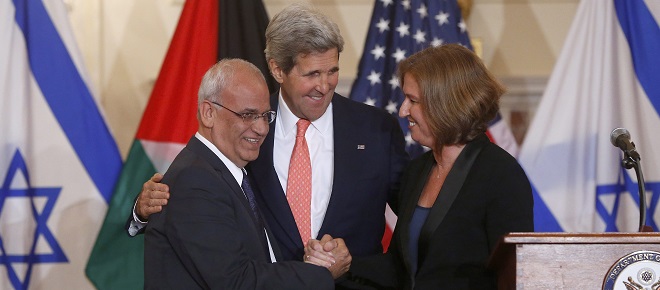Hopeful negotiators talk peace in the Middle East
Skepticism fades after two days of Israeli-Palestinian peace talks
Secretary of State John Kerry stands between Israel’s Justice Minister and chief negotiator Tzipi Livni, right, and Palestinian chief negotiator Saeb Erekat, as they shake hands after the resumption of Israeli-Palestinian peace talks, Tuesday, July 30, 2013, at the State Department in Washington. (AP Photo/Charles Dharapak)
Share

In a part of the world where conflict often trumps hope despite anyone’s best intentions, suddenly hope springs. Israeli and Palestinian negotiators, helped along by American counterparts, have embarked on a peace process they hope to conclude in nine months.
After two days of initial negotiations, with more meetings on the table in coming weeks, everyone was upbeat. Tzipi Livni, the Israeli justice minister, hoped the talks would “create solutions and make decisions for the future.” Saeb Erekat, the Palestinian at the table, said his people would benefit most from peace. The Globe and Mail‘s Patrick Martin remarked that Erekat, who’s been at similar tables before, is “usually gloomier.” The National Post fronted the negotiations with a straight-forward look at the negotiators’ goals: namely, to conclude a peace agreement amidst insecurity that’s plaguing the region.
What a difference a day makes. Yesterday, the National Post gave front-page real estate to widespread Israeli anger over the government’s decision to turn over 104 Palestinian prisoners, an exchange was a pre-condition for negotiations. Prime Minister Benjamin Netanyahu called that turnover “an indescribably difficult decision to make. It is painful for the bereaved families, it is painful for the entire nation and it is also painful for me.”
Eighty-four per cent of Israelis oppose prisoner exchanges under such circumstances, according to one poll. And the Post gave space to plenty of victims’ families who hated the idea that violent criminals among the 104 released prisoners would once again walk free. That public anger served as the backdrop to negotiations rife with skepticism. As talks began, The Globe wrote that “optimism was in short supply” after so many decades of futile attempts at peace.
For the time being, anyway, that pessimism is all in the past. Yesterday’s smiles and handshakes and happy thoughts might be fleeting, but it’s clear that newspapers on our side of the world will broadcast far and wide any glimmer of hope in a region that’s so often the source of so much darkness.
What’s above the fold this morning?
The Globe and Mail leads with optimism on all sides as Israelis and Palestinians undertake negotiations to end their decades-old conflict. The National Post fronts the hope that a peace agreement can be reached within nine months. The Toronto Star goes above the fold with the identity of the police officer who allegedly shot and killed 18-year-old Sammy Yatim: Const. James Forcillo. The Ottawa Citizen leads with the higher costs associated with the military’s attempts to purchase equipment from Canadian suppliers. iPolitics fronts questions about whether or not Employment Minister Jason Kenney can achieve the same success in his current portfolio as he did as immigration minister. CBC.ca leads with Forcillo, a six-year veteran of Toronto’s police force. CTV News leads with Forcillo, who apparently has a small baby at home. National Newswatch showcases a CTV News story that reports the feds are considering hiring replacement workers at foreign missions during ongoing job action.
Stories that will be (mostly) missed
| 1. Veterans. When Conservatives fight for re-election, they may face opposition from new veterans who say the government isn’t providing them the same care afforded to older veterans. | 2. Food subsidy. Auditor General Michael Ferguson will analyze a federal program aimed at subsidizing part of the often exorbitant cost of food in Canada’s northern communities. |
| 3. Canada-U.S. border. An RCMP memo says American officials want their border guards to be exempt from Canadian laws as part of a cross-border policing pilot project. | 4. Oil spill. An ongoing underground oil spill in Cold Lake, Alta., is apparently no threat to humans, but the thousands of litres of released bitumen have so far killed dozens of animals. |
| 5. Zimbabwe. A European election monitor says elections in Zimbabwe, which longtime president Robert Mugabe insists will be run fairly, are prone to disorganization and vote rigging. | 6. Gay rights. Gay bars across North America are boycotting Russian vodka in the wake of sweeping anti-gay legislation that’s passed into law in Russia. Some vodka makers dispute its effectiveness. |